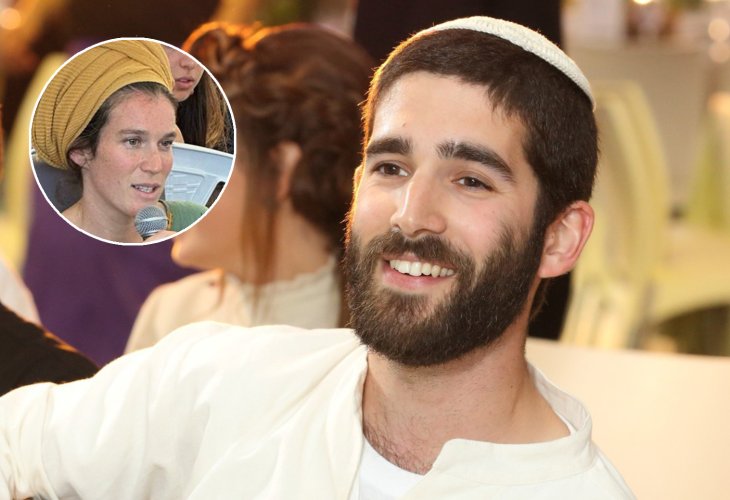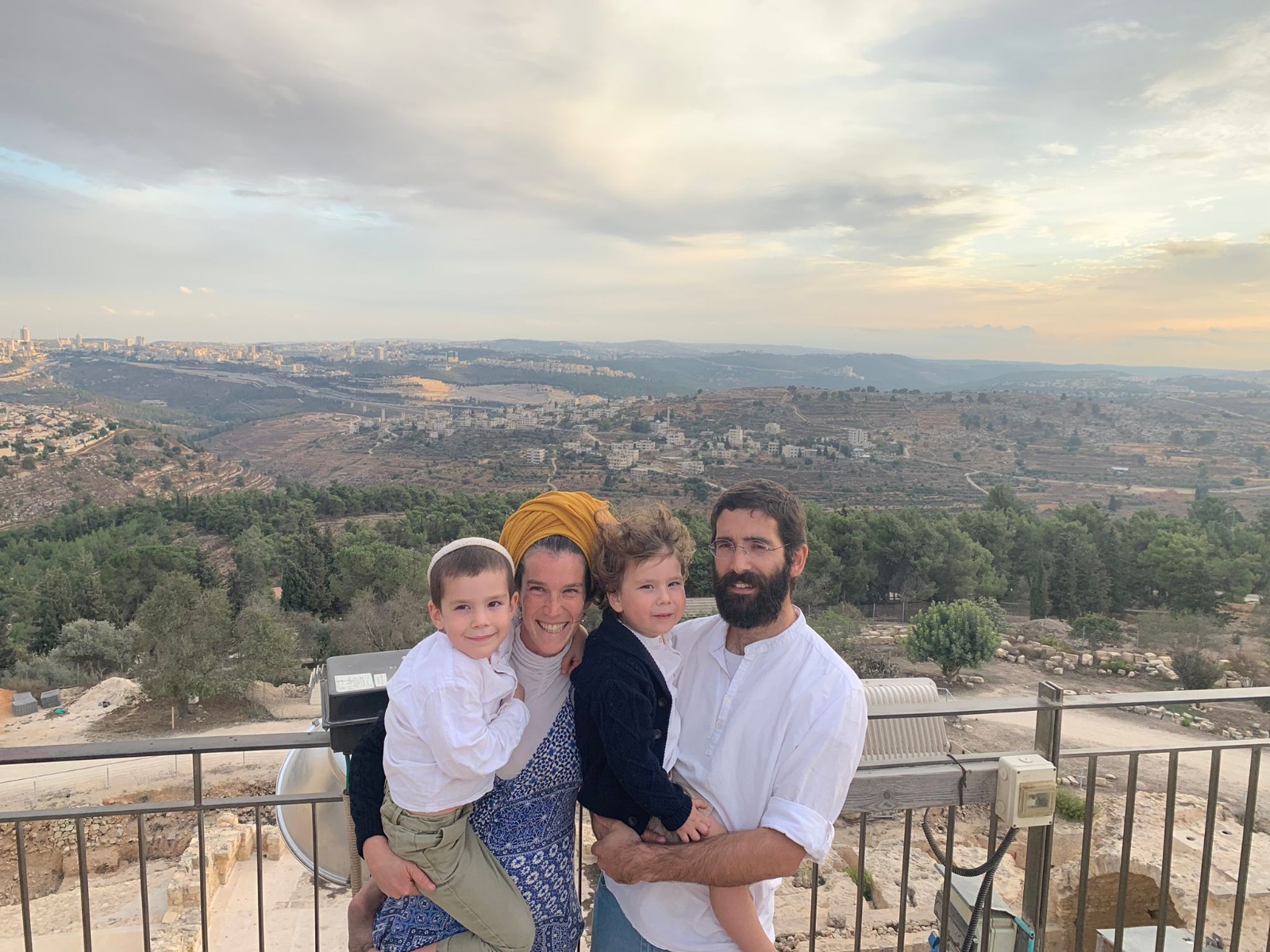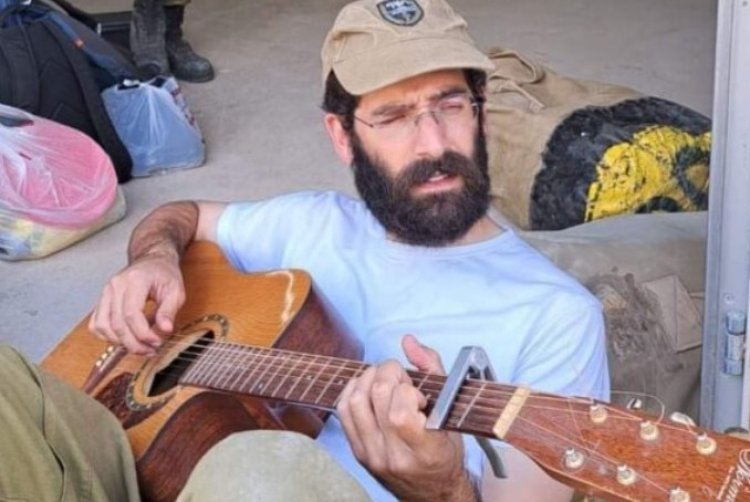Yifat Zuf Ashchar: "Naaran Dreamed for Years to Donate a Kidney, But Knew It Would Prevent Him from Joining the Reserves"
Despite recently donating a kidney, he insisted on enlisting and joining the fight. Always lifting the spirits of fellow soldiers, his loss leaves a profound emptiness for his (strong) wife left behind. A truly moving interview, marking thirty days since the passing of Naaran Ashchar HY'D.

Four months before the war, Naaran Ashchar fulfilled his dream of donating a kidney, becoming the third family member to do so. For years, he dreamed and envisioned this, but feared that once he donated, his high profile as a fighter would decrease, and he'd have to give up the reserve service he so believed in.
"When the war broke out, he fought to enlist despite doctors' warnings and even reached the head of the transplant department at Beilinson Hospital, who authorized his enlistment," his widow, Yifat Zuf Ashchar, describes. "When that happened, nobody was happier than him."
Later, at just 33 years old, Naaran was critically injured when a tank overturned during an operational activity on the northern border. Doctors fought for his life for a week. In his passing, he left behind his family, including his wife and two young children, ages three and nearly six.
"We Had a Shared Mission"
The couple met and married eight years ago. Yifat Zuf, who was then 20, describes a deep and meaningful relationship: "Our life together was very good, fun, and full of positive actions. For most of the years, Naaran was a talmid chacham, and then he began teaching Torah at the 'Baka' yeshiva in Shedmot Mehola. The new head of the yeshiva decided he should teach there and told him: 'I will be the head, and you will be the heart.' I began teaching simultaneously at a seminary in Beit She'an. The last two years were full of a positive, mainly educational mission for both of us. We did many things together for the People of Israel.
"I always knew I married an amazing person, and after the wedding, this knowledge only grew stronger. I constantly discovered more depth in him. The children's births opened up new and exciting layers in him as a father. He used to take our eldest son with him everywhere, in all sorts of situations: from the kidney donation tests, when he couldn’t find a babysitter, to comforting mourners or studying with distant friends, not wanting it to fall on me, so he took them for study and music. Today, people feel children block their self-fulfillment, and it’s not like that at all.
"He truly was a model husband, always looking for ways to make me happy, what to give or buy, and ensure my well-being. I remember how after childbirth, I was overwhelmed with caring for the baby and barely left home. He wouldn't give up and called friends to come visit and cheer me up.
"He recently heard about Amiram Ben Uliel, and the story really touched him. He simply went near his prison in Be'er Sheva, where there was a support demonstration, strengthened his father, participated in another demonstration, and planned another event in our area. He wanted to influence public opinion, explained how important it was, because only the Prime Minister and the head of the Shin Bet could change his situation, and it was simply a wrong being done to our brother, and he would do everything for it. It gave him strength in life and energy.
"He also deeply invested in his students. He wanted so much to bring them into the mikveh of Torah so they would truly feel part of the People of Israel. For him, Torah was always the greatest light illuminating life, that when you connect to it, you truly learn differently, fulfill mitzvot differently, and go to the army differently. It was also like that in the war. In the first two weeks of fighting, he continuously strengthened, listened to fears and concerns of the soldiers, and empowered everyone. He told them we were fighting for the disgrace that occurred on Simchat Torah and explained to our children that 'those who fight against the People of Israel are essentially fighting against Hashem, and we must show them what this means.'
"During the war itself, we both managed to be very much on a level for the People of Israel. I teach at the seminary in Beit She'an, and until his death, I was a class teacher and agriculture teacher, and I did many volunteer activities with the girls. I decided not just to be alone at home and endure. I also listened to lectures saying that war is an opportunity to step up a level.
"He was truly a man of Torah, even though he didn’t agree to be called a rabbi and didn’t look like one. When the Chief Rabbi, Rabbi David Lau, came to console us, I told him that after the fighting following the Simchat Torah disaster, he came with his guitar, played piyutim, and cheered all the soldiers, even though the Shabbat had not yet ended, because he felt there was a heavy atmosphere, and suddenly the atmosphere changed from zero to one hundred. Everyone started praying and strengthened in hope and faith. The rabbi explained to me that there is indeed a ruling by the 'Tosafot' regarding the matter of pikuach nefesh in war that he aimed at. He was always involved with great people in Jewish law."
Weren't you afraid when he wanted to enlist after donating a kidney?
"At first, I told him it's important to be responsible, and in any case, he has a weapon and understanding of the human psyche, which is also a mission he can act upon in our settlement and elsewhere. Decisions of this kind were always joint decisions for us. I also told him it’s important this decision doesn't harm him, that it wouldn't happen that heaven forbid, in the middle of the war, suddenly he would have no strength. But after he spoke with the department head, who simply told him it was possible and that there was no problem, and that he was envious and would have enlisted himself if he weren’t needed so much in his position - I decided to support him. We always talked about how only from the moment you truly decide to do what you believe in, you are complete with it and can truly live. He planned to return from the war and live with full force."
Did you feel this would happen?
"No, but I always had a feeling he was a great light. He had a short and last visit home on Thursday, when the injury was on Sunday. His mother said that on Friday, when he returned to base, she felt it. We also found something he wrote related to death, illustrating how much the soul felt it.
"In truth, Naaran also studied and talked about death recently, through Erwin Yalom, a psychiatrist he greatly admired. He read his book on existential psychotherapy and even talked about it with people older than him. It was a bit strange: a 32-year-old talking to 60-year-old friends about death...".
Do you remember the moment you realized it happened?
"I don't remember the moment soldiers knocked on the door and told me my husband was seriously injured, but I know I drove to him from there... I was by his side for a week. I would return for a short visit with the children and then back to him. To me, that week was mainly for the family and for me, because he wasn't conscious at all on the visible level."

"I Truly Felt as It Says, That 'The Shechinah is at the Head of a Sick Person'"
How are you coping with parting from him after such a meaningful connection?
"It’s a coming and going. I try to listen to deep and high people, it gives me strength that he truly is with us, just in another way. The digestion is very difficult. My brother got married last Wednesday and was supposed to get married earlier, the day after the tank accident, so even before the injury, when Naaran was enlisted, I was already prepared to be alone at the wedding, because I felt he would not be able to be released for the wedding. Many people came who weren’t supposed to come originally: Naaran's friends and rabbis, and we felt that whoever is with us in sorrow is also with us in happiness. It was very moving.
"We cry, but in general, there is an understanding that this is a parting from the visible realm of life, of the senses, to the soul level. Even in life, he tried to connect to the soul level and to the greats of Israel who are not alive. He dreamed, for example, of Rabbi Moshe Chaim Luzzatto and Rabbi Mordechai Eliyahu, and he had many holy thoughts, spirit, and soul, and a lot of Kabbalah he studied. So already in life, I slightly knew his soul level, and from there I also manage to connect with him. Our connection was very, very deep. So that helps a lot.
"In world culture, death is the end, it’s not the beginning of something else as in Judaism. Clearly, it's painful, the pain is the most apparent, you can even talk about it really. But you meet big people, through whom you understand that death is also the beginning of something else.
"Since his death, close and distant people who knew him really describe that something calls them to be more precise and better, as if he is with them. Truly, many friends and people, connected to various circles, feel the orphanhood. When you open yourself a moment to this channel, then you truly feel him with us, acting from above. A friend of his told me something from the holy Zohar, that 'the righteous are more present in their death than in their life.' I feel he is with us, although it's not easy for me."
Do you remember your last moments together?
"On Shabbat, we were close to him, and I tried to be with him a lot. I felt those were very powerful days, with his soul truly with us, even though his body was fading. I prayed, sang, and studied Torah near him. Everyone who came was constantly in singing and prayers, each one and what they deeply felt towards him in their heart.
"Rabbi Yigal Levinstein, my rabbi whom I studied with at the seminary, spoke to me about how the soul is at its peak precisely when the influence of the body diminishes. And then I truly felt as it says, that 'the Shechinah is at the head of a sick person,' and that it’s a time to pray. Indeed, during the injury, when everyone prayed for him in Israel and worldwide, they released the first captive soldier, Uri Megidish, and I felt that Hashem sees this, and all the prayers find their paths.
"For me, in my story, they didn’t knock on my door and announce that my husband was killed, but that he was seriously injured, and I felt that this additional week was a week of grace, and it was very powerful. There were times with many people by his side, and also times I could be alone with him, and I truly parted from him. That also gives strength. Everyone can see it differently. Unlike him, he had a friend who was with him in the tank, named Yinon Fleishman, who was killed on the spot, and his widow shared with me that she felt that was what was right for her."
"I Am Busy Trying to Realize His Dream"
As a teacher at 'Baka' Yeshiva, an institution with a 30-year presence, Naaran had a dream: for all students to have a kind of music room, a place for soul talks, for meeting, shared study or music, in a different atmosphere that opens the heart. "Sometimes he practiced 'mindfulness' with them, a method for self-relaxation, and always dreamed of having a quiet room for such things, a transition space, where one could exchange energy and aid their psychological and emotional development," describes Yifat Zuf. "He didn't get to buy a piano and was constantly looking for a caravan to renovate and build such a room.

"During the seven days of mourning, the idea arose from the yeshiva staff to work to establish such a room. They asked us if we would agree, and we were very happy. Currently, we want to open it for workshops and generally for the wider audience, with a small room for a studio, which will also serve as an opportunity to memorialize him. A room that truly continues him, what was important to him, as someone who always wanted to open the students' hearts, and that the Torah would accompany them from there all their lives.
"Naaran was very connected to music, he played many instruments, was truly talented from a very young age, played the violin from age 6 at the conservatory. That was the first instrument he learned, and he taught himself all the other instruments at a very high level on his own: piano, guitar, eastern instruments, recorder. He had an organ where he could play multiple instruments simultaneously and could spend an entire Shabbat thinking about the role of each instrument, and on Saturday night compose it. He could have been one of the best arrangers in the country, and he knew it. He had an amazing musical arrangement capability, so he used his talent to make people happy. It was hard for him because he was really good at it, but Naaran simply chose Torah."
Yifat Zuf Ashchar was featured in the program "Not Taken for Granted," hosted by Moran Kurs. The full interview will be published soon.

